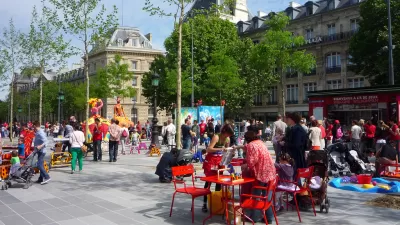'Placemaking,' the process by which cities and developers supposedly create appealing public spaces, is in a crisis, writes critic James Russell. Too many "made" places are generic and lack true relevance to the cities that build them.

The nonprofit Project for Public Spaces has, for years, championed the creation of plazas, parks, public markets, and other outdoor spaces that invite activity and make cities more appealing. They have been involved with as many as 3,000 projects to date. While "placemaking" may pursue lauadable goals, archtiecture critic James Russell cautions that some placemaking efforts are as generic as the dead cityscapes that they aim to improve.
Russell is particularly concerned about sense of place—the unique attributes of a city—rather than formulaic notions about amenties. He writes on his blog, "After you hack through thickets of slogans and vagaries, Placemaking seems to comprise a community-driven process for designing public spaces (streets, sidewalks, plazas, squares, campuses, parks, and so on) that are mixed use, host a variety of activities for diverse audiences, and are well-connected to the larger city or town."
Russell blames PPS—but not entirely:
"Placemaking could only gain currency because our building and development processes create so little that is inviting and memorable. America’s default is to assemble standardized real-estate products along roads engineered for auto throughput, and call it a day. Placelessness is so ubiquitous and such second nature that it is actually hard to think about what it takes to make a building or streetscape that’s appealing, that feels as if it belongs."
Russell offers a few examples of what he considers successful, unique places—including Seattle's Glassworks, La Jolla's Salk Center, and New York's Broadway Apple Store—and a few that represent what he considers tired New Urbanist retreads.
FULL STORY: Enough of Bogus “Placemaking”

Planetizen Federal Action Tracker
A weekly monitor of how Trump’s orders and actions are impacting planners and planning in America.

San Francisco's School District Spent $105M To Build Affordable Housing for Teachers — And That's Just the Beginning
SFUSD joins a growing list of school districts using their land holdings to address housing affordability challenges faced by their own employees.

The Tiny, Adorable $7,000 Car Turning Japan Onto EVs
The single seat Mibot charges from a regular plug as quickly as an iPad, and is about half the price of an average EV.

Seattle's Plan for Adopting Driverless Cars
Equity, safety, accessibility and affordability are front of mind as the city prepares for robotaxis and other autonomous vehicles.

As Trump Phases Out FEMA, Is It Time to Flee the Floodplains?
With less federal funding available for disaster relief efforts, the need to relocate at-risk communities is more urgent than ever.

With Protected Lanes, 460% More People Commute by Bike
For those needing more ammo, more data proving what we already knew is here.
Urban Design for Planners 1: Software Tools
This six-course series explores essential urban design concepts using open source software and equips planners with the tools they need to participate fully in the urban design process.
Planning for Universal Design
Learn the tools for implementing Universal Design in planning regulations.
Smith Gee Studio
City of Charlotte
City of Camden Redevelopment Agency
City of Astoria
Transportation Research & Education Center (TREC) at Portland State University
US High Speed Rail Association
City of Camden Redevelopment Agency
Municipality of Princeton (NJ)




























